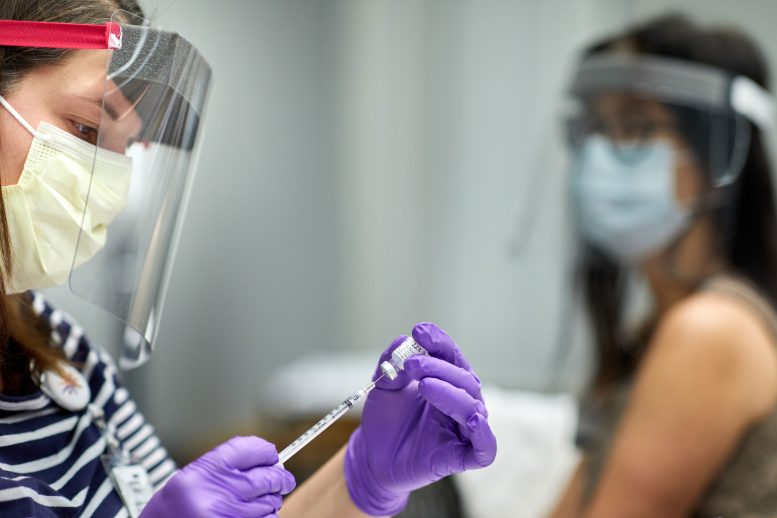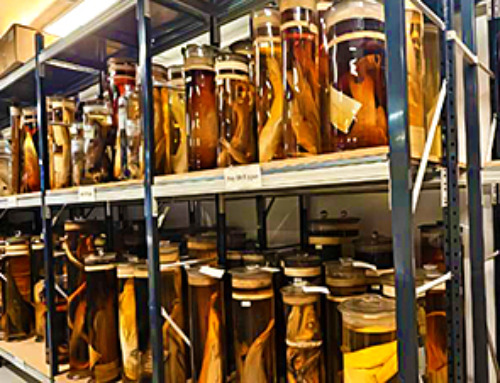The response to an updated vaccine is influenced by previous vaccinations but also produces broadly neutralizing antibodies.
The COVID-19 pandemic has ended, yet the virus responsible continues to circulate, hospitalizing thousands weekly and frequently producing new variants. Due to the virus's remarkable capacity for mutation and immune evasion, the World Health Organization (WHO) advises yearly updates to COVID-19 vaccines.
However, some scientists worry that the remarkable success of the first COVID-19 vaccines may work against updated versions, undermining the utility of an annual vaccination program. A similar problem plagues the annual flu vaccine campaign; immunity elicited by one year's flu shots can interfere with immune responses in subsequent years, reducing the vaccines' effectiveness.
A new study by researchers at Washington University School of Medicine in St. Louis helps to address this question. Unlike immunity to influenza virus, prior immunity to SARS-CoV-2, the virus that causes COVID-19, doesn't inhibit later vaccine responses. Rather, it promotes the development of broadly inhibitory antibodies, the researchers report.
Benefits of Repeated Vaccination
The study, available online in Nature, shows that people who were repeatedly vaccinated for COVID-19 — initially receiving shots aimed at the original variant, followed by boosters and updated vaccines targeting variants — generated antibodies capable of neutralizing a wide range of SARS-CoV-2 variants and even some distantly related coronaviruses. The findings suggest that periodic re-vaccination for COVID-19, far from hindering the body's ability to recognize and respond to new variants, may instead cause people to gradually build up a stock of broadly neutralizing antibodies that protect them from emerging SARS-CoV-2 variants and some other coronavirus species as well, even ones that have not yet emerged to infect humans.
"The first vaccine an individual receives induces a strong primary immune response that shapes responses to subsequent infection and vaccination, an effect known as imprinting," said senior author Michael S. Diamond, MD, PhD, the Herbert S. Gasser Professor of Medicine. "In principle, imprinting can be positive, negative, or neutral. In this case, we see strong imprinting that is positive, because it's coupled to the development of cross-reactive neutralizing antibodies with remarkable breadth of activity."
Healthcare workers received the first doses of the COVID-19 vaccine in December 2020. A study by researchers at Washington University School of Medicine in St. Louis has found that repeat vaccination with updated versions of the COVID-19 vaccine promotes the development of antibodies that neutralize a wide range of variants of the virus that causes COVID-19, as well as related coronaviruses. Credit: Matt Miller/Washington University
Imprinting is the natural result of how immunological memory works. A first vaccination triggers the development of memory immune cells. When people receive a second vaccination quite similar to the first, it reactivates memory cells elicited by the first vaccine. These memory cells dominate and shape the immune response to the subsequent vaccine.
In the case of the flu vaccine, imprinting has negative effects. Antibody-producing memory cells crowd out new antibody-producing cells, and people develop relatively few neutralizing antibodies against the strains in the newer vaccine. But in other cases, imprinting can be positive, by promoting the development of cross-reactive antibodies that neutralize strains in both the initial and subsequent vaccines.
Study on Imprinting and Its Effects
To understand how imprinting influences the immune response to repeat COVID-19 vaccination, Diamond and colleagues including first author Chieh-Yu Liang, a graduate student, studied the antibodies from mice or people who had received a sequence of COVID-19 vaccines and boosters targeting first the original and then omicron variants. Some of the human participants also had been naturally infected with the virus that causes COVID-19.
The first question was the strength of the imprinting effect. The researchers measured how many of the participants' neutralizing antibodies were specific for the original variant, the omicron variant, or both. They found that very few people had developed any antibodies unique to omicron, a pattern indicative of strong imprinting by the initial vaccination. But they also found few antibodies unique to the original variant. The vast majority of neutralizing antibodies cross-reacted with both.
The next question was how far the cross-reactive effect extended. Cross-reactive antibodies, by definition, recognize a feature shared by two or more variants. Some features are shared only by similar variants, others by all SARS-CoV-2 variants or even all coronaviruses. To assess the breadth of the neutralizing antibodies, the researchers tested them against a panel of coronaviruses, including SARS-CoV-2 viruses from two omicron lineages; a coronavirus from pangolins; the SARS-1 virus that caused the 2002-03 SARS epidemic; and the Middle Eastern Respiratory Syndrome (MERS) virus. The antibodies neutralized all the viruses except MERS virus, which comes from a different branch of the coronavirus family tree than the others.
Further experiments revealed that this remarkable breadth was due to the combination of original and variant vaccines. People who received only the vaccines targeting the original SARS-CoV-2 variant developed some cross-reactive antibodies that neutralized the pangolin coronavirus and SARS-1 virus, but the levels were low. After boosting with an omicron vaccine, though, the cross-reactive neutralizing antibodies against the two coronavirus species increased.
Taken together, the findings suggest that regular re-vaccination with updated COVID-19 vaccines against variants might give people the tools to fight off not only the SARS-CoV-2 variants represented in the vaccines, but also other SARS-CoV-2 variants and related coronaviruses, possibly including ones that have not yet emerged.
"At the start of the COVID-19 pandemic, the world population was immunologically naïve, which is part of the reason the virus was able to spread so fast and do so much damage," said Diamond, also a professor of molecular microbiology and of pathology & immunology. "We do not know for certain whether getting an updated COVID-19 vaccine every year would protect people against emerging coronaviruses, but it's plausible. These data suggest that if these cross-reactive antibodies do not rapidly wane — we would need to follow their levels over time to know for certain — they may confer some or even substantial protection against a pandemic caused by a related coronavirus."
Reference: "Imprinting of serum neutralizing antibodies by Wuhan-1 mRNA vaccines" by Chieh-Yu Liang, Saravanan Raju, Zhuoming Liu, Yuhao Li, Guha Asthagiri Arunkumar, James Brett Case, Suzanne M. Scheaffer, Seth J. Zost, Cory M. Acreman, Matthew Gagne, Shayne F. Andrew, Deborah Carolina Carvalho dos Anjos, Kathryn E. Foulds, Jason S. McLellan, James E. Crowe Jr., Daniel C. Douek, Sean P. J. Whelan, Sayda M. Elbashir, Darin K. Edwards and Michael S. Diamond, 15 May 2024, Nature.
DOI: 10.1038/s41586-024-07539-1
The study was funded by the National Institutes of Health, the Vaccine Research Center, and Moderna.
News
Analyzing Darwin’s specimens without opening 200-year-old jars
Scientists have successfully analyzed Charles Darwin's original specimens from his HMS Beagle voyage (1831 to 1836) to the Galapagos Islands. Remarkably, the specimens have been analyzed without opening their 200-year-old preservation jars. Examining 46 [...]
Scientists discover natural ‘brake’ that could stop harmful inflammation
Researchers at University College London (UCL) have uncovered a key mechanism that helps the body switch off inflammation—a breakthrough that could lead to new treatments for chronic diseases affecting millions worldwide. Inflammation is the [...]
A Forgotten Molecule Could Revive Failing Antifungal Drugs and Save Millions of Lives
Scientists have uncovered a way to make existing antifungal drugs work again against deadly, drug-resistant fungi. Fungal infections claim millions of lives worldwide each year, and current medical treatments are failing to keep pace. [...]
Scientists Trap Thyme’s Healing Power in Tiny Capsules
A new micro-encapsulation breakthrough could turn thyme’s powerful health benefits into safer, smarter nanodoses. Thyme extract is often praised for its wide range of health benefits, giving it a reputation as a natural medicinal [...]
Scientists Develop Spray-On Powder That Instantly Seals Life-Threatening Wounds
KAIST scientists have created a fast-acting, stable powder hemostat that stops bleeding in one second and could significantly improve survival in combat and emergency medicine. Severe blood loss remains the primary cause of death from [...]
Oceans Are Struggling To Absorb Carbon As Microplastics Flood Their Waters
New research points to an unexpected way plastic pollution may be influencing Earth’s climate system. A recent study suggests that microscopic plastic pollution is reducing the ocean’s capacity to take in carbon dioxide, a [...]
Molecular Manufacturing: The Future of Nanomedicine – New book from Frank Boehm
This book explores the revolutionary potential of atomically precise manufacturing technologies to transform global healthcare, as well as practically every other sector across society. This forward-thinking volume examines how envisaged Factory@Home systems might enable the cost-effective [...]
New Book! NanoMedical Brain/Cloud Interface – Explorations and Implications
New book from Frank Boehm, NanoappsMedical Inc Founder: This book explores the future hypothetical possibility that the cerebral cortex of the human brain might be seamlessly, safely, and securely connected with the Cloud via [...]
Global Health Care Equivalency in the Age of Nanotechnology, Nanomedicine and Artificial Intelligence
A new book by Frank Boehm, NanoappsMedical Inc. Founder. This groundbreaking volume explores the vision of a Global Health Care Equivalency (GHCE) system powered by artificial intelligence and quantum computing technologies, operating on secure [...]
Miller School Researchers Pioneer Nanovanilloid-Based Brain Cooling for Traumatic Injury
A multidisciplinary team at the University of Miami Miller School of Medicine has developed a breakthrough nanodrug platform that may prove beneficial for rapid, targeted therapeutic hypothermia after traumatic brain injury (TBI). Their work, published in ACS [...]
COVID-19 still claims more than 100,000 US lives each year
Centers for Disease Control and Prevention researchers report national estimates of 43.6 million COVID-19-associated illnesses and 101,300 deaths in the US during October 2022 to September 2023, plus 33.0 million illnesses and 100,800 deaths [...]
Nanomedicine in 2026: Experts Predict the Year Ahead
Progress in nanomedicine is almost as fast as the science is small. Over the last year, we've seen an abundance of headlines covering medical R&D at the nanoscale: polymer-coated nanoparticles targeting ovarian cancer, Albumin recruiting nanoparticles for [...]
Lipid nanoparticles could unlock access for millions of autoimmune patients
Capstan Therapeutics scientists demonstrate that lipid nanoparticles can engineer CAR T cells within the body without laboratory cell manufacturing and ex vivo expansion. The method using targeted lipid nanoparticles (tLNPs) is designed to deliver [...]
The Brain’s Strange Way of Computing Could Explain Consciousness
Consciousness may emerge not from code, but from the way living brains physically compute. Discussions about consciousness often stall between two deeply rooted viewpoints. One is computational functionalism, which holds that cognition can be [...]
First breathing ‘lung-on-chip’ developed using genetically identical cells
Researchers at the Francis Crick Institute and AlveoliX have developed the first human lung-on-chip model using stem cells taken from only one person. These chips simulate breathing motions and lung disease in an individual, [...]
Cell Membranes May Act Like Tiny Power Generators
Living cells may generate electricity through the natural motion of their membranes. These fast electrical signals could play a role in how cells communicate and sense their surroundings. Scientists have proposed a new theoretical [...]






















